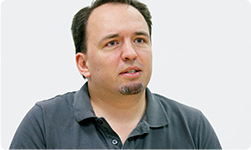So Mobiclip and Nintendo had been building a stronger relationship like this and it was around this time that Mobiclip investors were thinking about selling the company to recoup the investment. My understanding is that the two of you then proposed Mobiclip becoming a part of the Nintendo group, is that right?
Yes, exactly. The projects we were working on with Nintendo were exciting. At one point I asked Jérôme if he agreed that it was only the Nintendo projects that were exciting and he replied saying, “Well, yes.” We were then bold enough to approach Nintendo and basically say that we wanted to concentrate only on Nintendo projects. Of course investors have their own agenda and we had to convince them. At that time I thought we had only maybe a 10% chance of success because I assumed Nintendo would not be interested in such an offer. We were really surprised when we saw Nintendo was willing to welcome this small French company.
Just like when Alex approached Okada-san for the first time. (laughs)
Exactly. We thought, “We have no chance anyway so we might as well go for it!”
What was it about the Nintendo projects that made them more exciting or appealing?
I think there are many factors, but what makes Nintendo attractive is that the innovation is key. You see companies just competing over hardware specs, saying how they have more megahertz23 than someone else. But that’s not really a creative way to move forward. We saw that Nintendo is so focused on creating new experiences and new technologies to enable them. 23. Megahertz: A unit of frequency. Represents computer processing speed.
Simply enhancing the specs to solve problems is not so exciting. When someone can solve problems with a unique idea, people call it innovation. And that’s what is the most interesting.
Nintendo has a track record of disruptive innovation with the Nintendo DS24 family, Wii25 and now Wii U26. It is very important for us to continue to produce such innovation and that was part of the appeal. 24. Nintendo DS family: A family of portable videogame systems that began with Nintendo DS, released in Japan in December 2004. It was later released in Europe in March 2005.25. Wii: A home games console system released in Japan in December 2006. It was also released in Europe in the same month.26. Wii U: A home games console released in Japan in December 2012. It was released in Europe in November of the same year.
I think there is also another point. We’re just a small company, but Nintendo trusted us and I think this is one of the reasons that pushed us towards Nintendo. Nintendo has been very open-minded and we built up a good relationship with Okada-san and Shimada-san27.27. Takeshi Shimada, Deputy General Manager of Nintendo Software Environment Development Department.
Yes, the trust that we built up with the Nintendo engineers is also a key point. We are engineers, Shimada-san at Nintendo is an engineer, and of course you are an engineer yourself. So this whole structure has a strong value for us because we know that technical challenges will be taken seriously.
So I guess my background in computer science as an engineer has had an impact on our relationship.
Yes, I think it did. We want to make a difference in Nintendo products. But we can only do this if we know that the people making the decisions really value a certain technical difference or idea. I think the skill of the CEO to make the right decisions is key.
So Shimada-san is now the contact point at Nintendo for NERD. What is it like working with him? Are you satisfied with the way you work together?
The obvious good thing is that he understands what we are doing. We are working on a wide range of areas from low-level optimisation to very high-level web technology, and most people wouldn’t be interested in all of them. But he is very interested and he understands. I think he also adapted a lot to our French culture and strange habits. He doesn’t try to change us or try to make us into Japanese people.
That’s something I always keep telling him. (laughs) For example, if we had you do things our way and asked Jérôme to come to this office in Paris from 9 to 5 each day, then NERD would lose what makes it special.
(laughs)
I’m not sure our colleagues would accept it. (laughs)
We are also very demanding people so I think it is a difficult task for people to manage us.
Right. I think Nintendo is the same in terms of being demanding. Recently whenever there is a difficult technical problem inside the company I always ask Shimada-san if he can talk to NERD about it. And I think you are happy to solve many of these problems for us, although maybe not all of them. I’m sure when Shimada-san came to NERD last week he presented some of the problems – were there any exciting ones among them?
Oh yes. (laughs) All of them. (laughs) Actually, we feel that we aren’t well suited to the kind of tasks where you just need an army of developers. You would need a very strong structure and organisation to create things like that.
But sometimes you have the kind of problem where a single engineer can come up with an idea that solves a problem a hundred engineers couldn’t fix. That’s where we have the most fun. These problems from you that Shimada-san presented to us were exactly like that. They are very difficult projects so we were very pleased about that.

I hope that other people in France and Europe who like solving those kinds of problems will come knocking on NERD’s door. (laughs) I’m sure the two of you will give people like that a warm welcome.
© 2024 Nintendo.